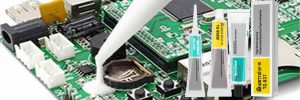During the construction process of adhesives, various aspects of performance are involved, such as surface drying time, curing depth, extrusion rate, etc. Among them, the extrusion rate is one of the most important properties for determining the workability of adhesives. The higher the extrudability, the greater the amount of adhesive applied per unit time.
In the field of industrial adhesive use, an adhesive product with a high extrusion rate not only enables workers to save more effort during the construction process but also allows for better control of the adhesive application rate, making the applied adhesive more uniform. In automatic adhesive dispensing machines, adhesives with high extrudability can ensure the adhesive output of the equipment, guarantee the smooth operation of the production line, and improve production efficiency.
On the other hand, adhesives with low extrudability are generally relatively thick. They are not easy to form filaments during the adhesive application process, which also ensures a clean and tidy construction process.

What are the inspection requirements for the extrusion rate of adhesive products?
Inspection Requirement 1
The test of the extrusion rate of adhesive is not suitable for products in all states. Generally, it is only suitable for paste-like and semi-paste-like products. For flowing and semi-flowing products, a rotational viscometer is usually used to test their fluidity. The reason is that during the test process of flowing and semi-flowing single-component adhesives, there is a tendency for the adhesive to overflow and be difficult to control, resulting in inaccurate extrusion amounts. When a rotor is used to test paste-like and semi-paste-like single-component adhesives, during the test process, the adhesive will transfer to the surroundings, causing a decrease in resistance and inaccurate rotational viscosity testing. Therefore, it is generally specified to test the extrusion rate.
Inspection Requirement 2
The conditions for testing the extrusion rate each time should be consistent. The relevant conditions include air pressure, pneumatic glue gun, stopwatch, electronic balance, nozzle, and the temperature of the adhesive. Any change in the conditions will affect the differences in the test data. For example, regarding the temperature of the adhesive, the test is generally carried out at 25°C. If the temperature of the adhesive is 30°C, there will definitely be differences in the data. As we all know, the higher the temperature, the relatively lower the viscosity. As for the diameter of the glue outlet nozzle, for instance, if it is not cleaned properly and gets blocked, it is equivalent to reducing the diameter, and the glue output will definitely slow down. Therefore, the test conditions for the extrusion rate of single-component adhesive require consistency.

Generally, apart from the formulation of the adhesive itself, the main factors affecting the extrudability are as follows:
First is the extrusion temperature. Under the condition that other factors remain unchanged, according to the principle of thermal expansion and contraction, the higher the temperature, the greater the extrudability of the adhesive.
Second is the extrusion pressure. When other conditions remain the same, the greater the pressure, the greater the extrudability.
Third is the diameter of the extrusion nozzle. Under the condition that other conditions remain unchanged, the larger the diameter of the extrusion nozzle, the greater the extrudability of the sealant.
Fourth, the length of the extrusion hose. The longer the extrusion path of the adhesive, the greater the frictional resistance it encounters, and the more difficult it is to extrude.

Therefore, when using glue dispensing machine equipment for construction, each manufacturer can appropriately adjust the extrusion pressure, the length of the glue hose, and the diameter of the extrusion nozzle according to the ambient temperature to achieve the appropriate extrudability of the adhesive and meet the construction requirements. Yantai Chemistry focuses on the production and research and development of electronic adhesives. It can provide one-stop adhesive application solutions for a wide range of customers, offer 1V1 services, and solve specific cases individually. If you have any adhesive-related problems, you are welcome to consult Yantai Chemistry.
